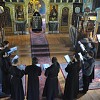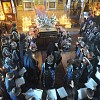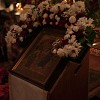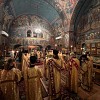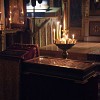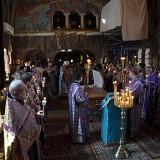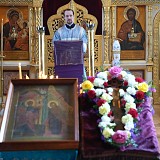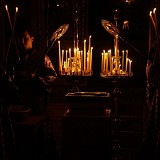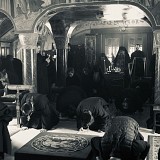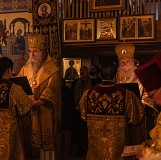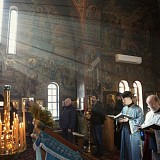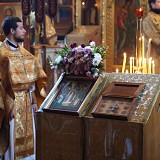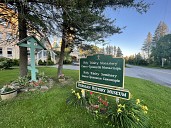Sermon on Great and Holy Thursday, 2013, by Deacon Ephraim Willmarth
In the name of the Father, and of the Son, and of the Holy Spirit:
Dear brothers and sisters, today’s Gospel reading, something so important that it is recorded by all four Evangelists, opens up a window to Jerusalem two millennia ago. We stand here as witnesses of this awesome event: it occurred in history, and exists eternally. We are at this moment in time and out of time: we are here in Jordanville, and also in that upper room, partakers with the disciples, hearing the words of the Lord: “With desire I have desired to eat this Passover with you before I suffer.” (Luke 22:15) With fear of God and faith, let us draw nigh.
The Lord had been preparing his disciples for three years, leading them deeper into the mystery which the Jewish Passover had so long prefigured. Jesus had multiplied the loaves, and distributed to his disciples, feeding all those who came to hear him. He raised them up even more, to their total astonishment, when He declared Himself to be the “bread from Heaven,” (Jn 6:58) the heavenly Manna, in such stark terms, saying “I am the living bread which came down from Heaven. If any man eat of this bread, he shall live for ever: and the bread which I give is my flesh, which I shall give for the life of the world,” (Jn. 6:51) and also “except ye eat the flesh of the Son of Man and drink His blood, ye have no life in you.” (Jn. 6:53)
The bewildered disciples cannot be credited for understanding these mysteries at first. St. John reports that “many of his disciples, when they had heard this, said ‘This is an hard saying. Who can hear it?’” (Jn. 6:50) In fact, some of them left. What can be said about those who remained? Jesus asked them “will you also go away?” and Peter replied “To whom shall we go? Thou hast the words of eternal life.” (Jn. 6:67-8) They recognized the Master, even with their incomplete understanding. We can even say, they had a supremely rational view: they stood in awe and reverence of what they could not grasp with their minds. A truly rational man acknowledges the limits of his intellect. The disciples, simple men, were in fact more rational than the so-called wise. Let’s take this example: Jesus said—“Before Abraham was—I AM” (Jn. 8:58)—He identifies Himself with the Sacred Hebrew name of God—the tetragrammaton—which would be blasphemy if it came from a mere man—and in fact some reacted by wanting to kill Jesus at that moment—but not the disciples—and so their faith and recognition of Him went before their understanding. Here we are reminded of the other scripture: “except ye become as little children, in no wise shall ye enter the kingdom of God.” And in this way we can approach such an incomprehensible mystery as the bloodless sacrifice which is on the altar table right now.
But not all of Jesus’ disciples arrived at this blessed and holy simplicity. In fact, all of them were in some way spiritually immature with such an example as we heard in the Matins Gospel, that a dispute arose among them as to who would be the greatest! (Luke 22:24) But the Longsuffering Lord taught them in this moment about true Godly greatness with such an example—to perform for them the duties of a slave. In that sublime moment of preparation for the Passover, one in which the disciples must have sensed the gravity of the moment, following Jesus’ triumphant entry into Jerusalem, and his references to his imminent suffering, their master, their mighty prophet, their hope for deliverance and blessedness, did not ask them to bow to him or kiss his hand, but He wrapped a towel around Himself and washed their feet. We heard last night: “He who wrapped the heavens with the clouds wrapped himself with a towel,” (Matins canon, Ode 5, Glory…) and washed their feet as a slave would do.
And so they were humbled, instructed and even illumined! We pray in the troparion:
“The glorious disciples were illumined at the Supper during the washing of the feet, but ungodly Judas was darkened by the disease of avarice, and he delivered Thee, the righteous Judge to lawless judges. See, O lover of money, how for money’s sake he hanged himself. Flee from the greed which made him dare to do such things against his Master. O Lord, who art good towards all men, glory to Thee.” (Lenten Triodion, tr. Kallistos Ware and Mother Mary)
One among the disciples who had been with them from the beginning, who had witnessed the mighty miracles, heard words of life from the mouth of God, was so possessed by love of money, that he was entirely unmoved by love and humility. Please listen to St. John the Golden-mouthed speak of such betrayal:
…he acted more grievously than any, not stoning indeed, nor insulting Him, but betraying and giving Him up, observe in how friendly sort He receiveth this man, washing his feet; for even in this way He desired to restrain him from that wickedness. Yet it was in His power, had He willed it, to have withered him like the fig-tree, to have cut him in two as He rent the rocks, to have cleft him asunder like the veil; but He would not lead him away from his design by compulsion, but by choice. Wherefore He washed his feet; and not even by this was that wretched and miserable man shamed. (Homily LXX on the Gospel of St. John, A Select Library of the Nicene and Post-Nicene Fathers of the Christian Church, P. Schaff, Eerdmans Publishing Co., p.385)
Judas served Jesus only outwardly. In secret, he served another master. St. John tells us he was a thief, and took money out of the disciples’ money bag which he held. “Whosover commits sin is a slave of sin” (Jn 8:34). We are slaves of sin when we steal.
All the disciples heard “Take, eat, this is my body,” and “Drink ye all of it, for this is my blood of the new Testament, which is shed for many for the remission of sins.” (Mt. 26:26-28)The eleven were sincerely repenting, but the one was still in bondage to his sin. And so what was grace and illumination to the eleven, was condemnation to the one. St. John the Evangelist reveals that Satan entered into his heart at that point, rose and went to betray the One Who made him.
Brothers and sisters, let us earnestly accept the invitation of the Lord to partake, let us return his desire to commune with us, and so leave behind our former ways, approach in sincere repentance, having confessed and prepared to receive the Divine Gifts, and so strengthened, we shall travel tomorrow by way of Golgotha and the Cross, to witness the Holy Resurrection of our Lord Jesus Christ, in hope of an eternal Pascha together with God the Father and the Most Holy Spirit. Amen.
Synaxarion for Holy and Great Thursday
On this day, Holy and Great Thursday, according to the order which our Holy Fathers inherited from the Holy Apostles, and the Holy Gospels, we celebrate four events: the Holy Washing of the Disciples' feet, the Mystical Supper (the institution of the Holy Mystery of the Eucharist, which we celebrate to this day), the Lord's Agony in the Garden, and His Betrayal.
On the morrow, Friday, the Passover sacrifice of the Hebrews was intended to take place, namely the slaughter of the lamb reared for this purpose. On that same Friday, the Truth was intended to follow the old type. For it was intended that the true Passover would be sacrificed, the Lamb of God the Father, who takes away the sin of the world - our Lord Jesus Christ, who was prefigured by the paschal lamb which was sacrificed each year by the Hebrews. On the evening of this day - which was the day of unleavened bread, the eve of the Passover of the Old Law, March 22, the fifth day of the week - Jesus observed the Passover and dined in the city with the Twelve Disciples. The Lord did this on the evening of the fifth day (Thursday), since among the Hebrews the "night-day" reckoning begins with the evening of the present day and is called the evening of the following day. In other words, according to Jewish tradition "Friday evening" was that time period that began after sundown on Thursday. (For example: as in the Orthodox Church today, the "liturgical evening" of a feast day would be that time after Vespers.) Zebedee (the father of the Holy Apostles James and John) prepared the Passover, since he was the one who carried the earthenware jar of water, as St. Athanasius the Great says and others also say exceptional things about Zebedee.
Afterwards, Jesus revealed more perfect and sublime teaching to His Disciples, and when night fully came, in the Upper Room He handed over the Mystery of our Passover. Thus, it is said that He reclined at supper with the Twelve. Notice that this was not the Passover of the Old Law, because He both reclined and gave a supper of bread and drink. Under the Old Law, the Jews stood, with girded loins and walking staffs in hand during the meal. There all things crumbled away through Fire, including the use of unleavened bread. Before He began to eat (thus says the divine Chrysostom), He rose from supper, laid aside His garments, and poured water into a basin in preparation for the Washing of the feet. He did these things both to shame Judas and to remind the other Disciples that it is not right to seek the first place. Similarly, after the washing, He exhorted them by saying that he who wishes to be first must be last of all, showing Himself as an example. It seems that Christ first of all washed Judas, who most presumptuously sat first in line, and last He came to Peter. Since Peter was more high-spirited than the others, he prevented the Teacher, but when at the same time he heard from the Lord that if Christ did not wash his feet he would have no part with the Lord, he yielded quite readily.
So our Lord Jesus Christ washed the feet of the Disciples and showed a paradoxical exaltation through humility. He took His garments again and leaned back and exhorted and entreated them that they love one another and not seek the first place. While they were eating, He brought up the main point concerning His Betrayal. Since the Disciples were confused about His saying, Jesus said quietly to John alone, "It is he to whom I shall give a piece of bread when I have dipped it" (John 13:26). He spoke in this way because if Peter, being more high-spirited than the others, had known the truth, he would have taken it upon himself to strike a blow against Judas. Jesus said again, "He who dipped his hand with Me in the dish will betray Me" (Matt. 26:23). When both these events had occurred, after a little silence He took the bread and said, "Take, eat; this is My Body" (Matt. 26:26; Mark 14:22), and likewise the Cup, "Drink from it, all of you. For this is My Blood of the New Covenant, which is shed for many for the remission of sins" (Matt. 26:27-28; Mark 14:24). "Do this in memory of Me" (Luke 22:19). He performed these deeds and ate and drank with them. Notice that He calls His Body bread - not unleavened bread. Sol let those who offer the unleavened sacrifice be ashamed. After Judas tasted the bread, Satan entered into him, because when he first tempted him he already ruled over him completely. Then he withdrew and proceeded to the High Priests, in order that he might hand Christ over to them for thirty pieces of silver.
After the Supper, the Lord went out with the Disciples to the Mount of Olives, to a certain place called Gethsemane. Then Jesus said to them, "All of you will be made to stumble because of Me this night, for it is written, I will strike the Shepherd, and the sheep will be scattered. But after I have been raised, I will go before you to Galilee" (Matt. 26:31-32; Mark 14:27).
Peter said to Him, "Even if all are made to stumble, yet I will not be."Jesus said to him, "Assuredly, I say to you that today, even this night, before the cock crows twice, you will deny Me three times" (Mark 14:28-30). He said "before the cock crows twice," because customarily the cock crows not once but even two or three times, and accordingly it so happened. Immeasurable grief, signifying the weakness of human nature, overtook Peter because of this saying of the Lord. The Lord withdrew in order that this might take place - after He handed over the whole world to Himself - so that of Himself He might make known the fickleness of human nature and grant pardon to sinners.
Nevertheless, on a higher level, the threefold denial of Peter depicted the sins of all men against God. These are the following: first is the transgression of the commandment which God gave to Adam, second is the transgression of the written Law, and third is the rejection of the Gospel proclamation. But when Peter repented, the Lord healed his denial and said three times, "Simon, son of Jonah, do you love Me?" (John 21:17). Thereafter, Jesus wished to show to the Disciples how fearful death is for all men, and He said, "My soul is exceedingly sorrowful, even to death. Stay here and watch with Me." He went a little farther and fell on His face and prayed, saying, "O My Father, if it is possible, let this cup pass from Me; nevertheless, not as I will but as You will" (Matt. 26:38-39). He said these things as a man in order to cleverly deceive the devil, so that he might think that Christ, although appearing as a man, feared death. He did this, while knowing the truth, so He might not forsake the Mystery of the Cross.
After this first prayer, the Lord returned to the Disciples and found them deep in sleep. Then the Lord addressed Peter and said, "What? Could you not watch with Me one hour? Watch and pray, lest you enter into temptation. The spirit indeed is willing, but the flesh is weak" (Matt. 26:40-41). He said these things to Peter so that he would clearly understand that He meant, "You say that you wish to struggle until death, so you doze in this manner with the rest?" Again, a second time, He went away and prayed, saying, "O My Father, if this cup cannot pass away from Me unless I drink it, Your will be done." And He came and found them asleep again, for their eyes were heavy. So He left them, went away again, and prayed the third time, saying the same words (Matt. 26:42-44). Then an angel appeared to Him from Heaven, strengthening Him. And being in agony, He prayed more earnestly. His sweat became like great drops of blood falling down to the ground (Luke 22:43-44). Then He came to His Disciples and said to them, "Are you still sleeping and resting? Behold, the hour is at hand, and the Son of Man is being betrayed into the hands of sinners. Rise, let us be going. See, My betrayer is at hand" (Matt. 26:45-46). Then He went beyond the brook of Kidron, where there was a garden that He entered with His Disciples. The Lord regularly frequented the garden, and so Judas was well acquainted with the place. Judas then took some of the band of soldiers, with a crowd following, and came upon Jesus, giving them the signal of the false kiss. He arranged it in this way because many times when the Lord was seized He passed out of their midst unseen. Yet the Lord came forward and said to them, "Whom are you seeking?" (John 18:4,7). Since it was still night, they did not recognize Him. Therefore they looked upon Him with lighted lanterns and torches, and with fear they slowly withdrew. When they returned, He made all things known.
When Judas gave the signal, Christ said, "Friend, why have you come?" (Matt.26:50). That is to say, "It is well timed, Judas, that you came." And again He said, "Have you come out, as against a robber, with swords and clubs to take Me? I sat daily with you, teaching in the Temple, and you did not seize Me" (Matt. 26:55). They came at night so that some kind of riot might not be provoked by the crowd. Then the very high-spirited Peter drew back a sword and rushed at Malchus, the servant of the High Priest, cutting off his right ear - the implication being that the High Priest neither heard nor taught the Law correctly. Then Christ reproved Peter, saying that it is not good that a spiritual man is known to make use of a sword, and He healed the ear of Malchus. They arrested Jesus and brought Him bound to the courtyard of the former High Priest, who was the father-in-law of Caiaphas. There all the Pharisees and Scribes who held sentiments against Christ had been assembled.
Also, as the night passed on, there occurred the conversation between Peter and the servant girl during which he denied the Lord three times as the cock crowed twice. When Peter remembered the Lord's prophecy, he wept bitterly (see Mark 14:66-72).
When day arrived, they brought Christ from Annas to the High Priest Caiaphas, where He accepted both the spitters and the false witnesses who were summoned. When the day was already advanced, Caiaphas sent Him to Pilate. Those who brought Him did not enter into the Praetorium. so that they might not be defiled and might eat the Passover. For it appears that it was fitting that they eat the Passover then, especially from the many things Christ said before the Supper on Thursday evening when He ate it and afterwards handed over the more superb and exalted teachings. For, as we have said before, it was fitting that the Truth was to follow what was typified in the Law. As St. John the Theologian says, all these events came together before the feast of the Passover during the night of Thursday and on into Friday. For this reason we keep the feast, properly remembering these awesome and ineffable works and deeds.
Through Your ineffable compassion, O Christ our God,
have mercy on us and save us.
Amen.
Troparion, Tone 8
When the glorious disciples at the supper were illumined by the washing of the feet,
then was the impious Judas darkened by the disease of avarice.
And he betrays Thee, the Righteous Judge, to the lawless judges.
See, O lover of possessions, how for money's sake he hanged himself!
Flee from that insatiate soul, which dared such things against His Master.
O Lord, who art good towards all men, glory to Thee!
Kontakion, Tone 2
Having taken the bread in his hands,
the traitor stretches out those hands in secret
to receive the price of Him who with his hands created man.
And Judas the slave and deceiver still repented not.
Ikos: Having all approached the mystical supper in fear, let receive the bread in purity of soul and remain with the Master, that we may behold how He washes the feet of His disciples. And let us do as we have seen Him do, submitting one to another and washing each other's feet. For so Christ commanded His disciples. But Judas the slave and deceiver took no heed.
The Exapostilarion (The Hymn of Light)
Thy bridal chamber, O my Savior, I see adorned,
and I have no raiment with which to enter therein.
Enlighten the garment of my soul, O Giver of Light, and save me.Behold, O Priest!
Source: http://www.synaxis.info
|
| |||||||||||||
